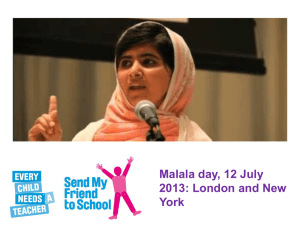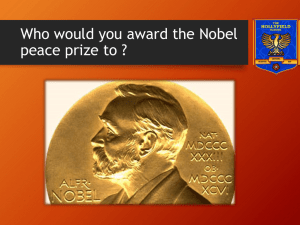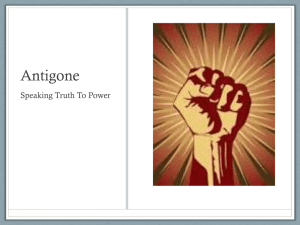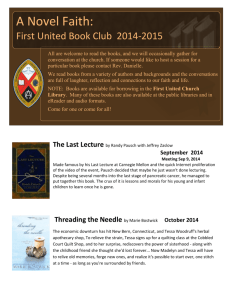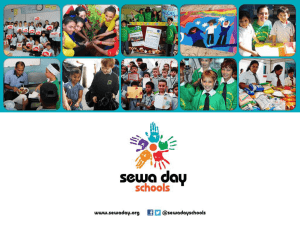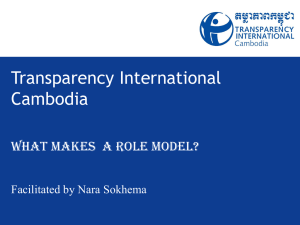English 10H - Marlboro Central School District
advertisement
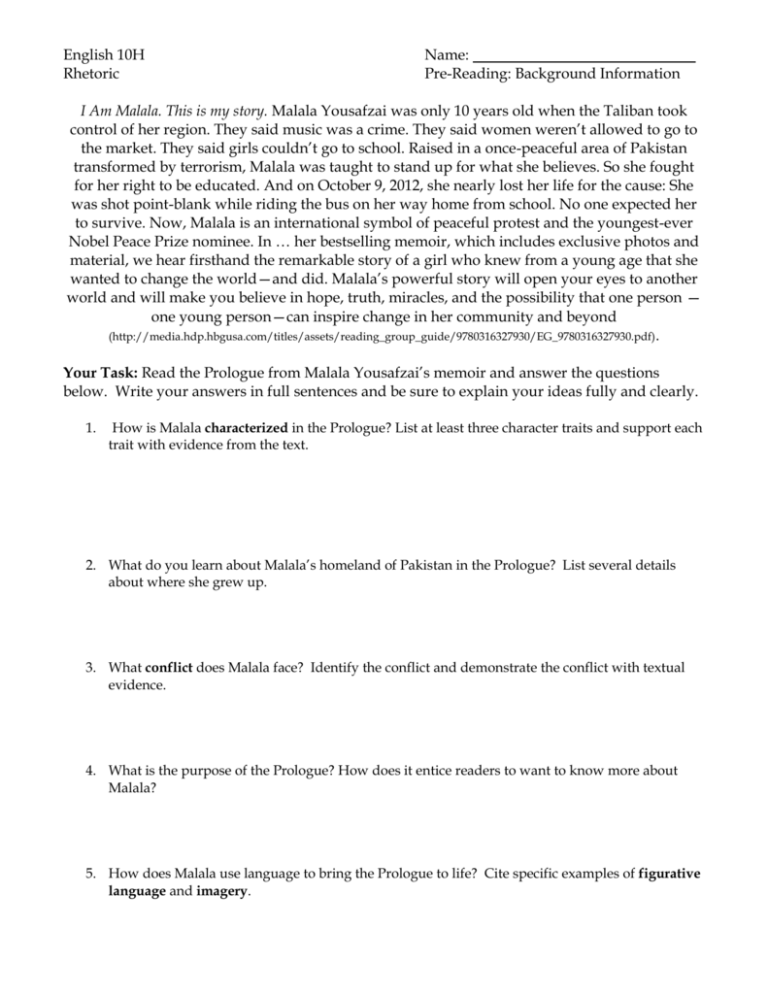
English 10H Rhetoric Name: Pre-Reading: Background Information I Am Malala. This is my story. Malala Yousafzai was only 10 years old when the Taliban took control of her region. They said music was a crime. They said women weren’t allowed to go to the market. They said girls couldn’t go to school. Raised in a once-peaceful area of Pakistan transformed by terrorism, Malala was taught to stand up for what she believes. So she fought for her right to be educated. And on October 9, 2012, she nearly lost her life for the cause: She was shot point-blank while riding the bus on her way home from school. No one expected her to survive. Now, Malala is an international symbol of peaceful protest and the youngest-ever Nobel Peace Prize nominee. In … her bestselling memoir, which includes exclusive photos and material, we hear firsthand the remarkable story of a girl who knew from a young age that she wanted to change the world—and did. Malala’s powerful story will open your eyes to another world and will make you believe in hope, truth, miracles, and the possibility that one person — one young person—can inspire change in her community and beyond (http://media.hdp.hbgusa.com/titles/assets/reading_group_guide/9780316327930/EG_9780316327930.pdf) . Your Task: Read the Prologue from Malala Yousafzai’s memoir and answer the questions below. Write your answers in full sentences and be sure to explain your ideas fully and clearly. 1. How is Malala characterized in the Prologue? List at least three character traits and support each trait with evidence from the text. 2. What do you learn about Malala’s homeland of Pakistan in the Prologue? List several details about where she grew up. 3. What conflict does Malala face? Identify the conflict and demonstrate the conflict with textual evidence. 4. What is the purpose of the Prologue? How does it entice readers to want to know more about Malala? 5. How does Malala use language to bring the Prologue to life? Cite specific examples of figurative language and imagery. English 10H Rhetoric Name: Speech Analysis Part I: Close-Reading As you read Malala Yousafzai’s “Address to the United Nations Youth Assembly,” which she delivered in July 2013, use the annotation codes listed on the chart below to identify and mark examples of rhetorical devices used in the speech. In addition, you should circle and define any unfamiliar vocabulary. Annotation Codes Box Out the central idea conveyed in the speech every time it appears ? Rhetorical Questions (a question to which no answer is required; a question asked solely to produce an effect or to make an assertion and not to elicit a reply; the purpose of these questions is mainly to make people think) Highlight examples of Ethos, Pathos, and Logos and label each example with E, P, L (E) Ethos (Credibility), or ethical appeal, Ethos refers to the trustworthiness or credibility of the writer or speaker. We tend to believe people who we respect. One of the central problems of argumentation is to project an impression to the reader that you are someone worth listening to, in other words making yourself as author into an authority on the subject of the paper, as well as someone who is likable and worthy of respect. If a speaker establishes credibility, the audience will feel ethically (morally) wrong if they do not support or agree with the ideas presented in the speech. (P) Pathos (Emotional) means persuading by appealing to the reader's emotions. The emotional or motivational appeals; vivid language, emotional language and numerous sensory details. (L) Logos (Logical): the logic or reasons used to support a claim; can also be the facts and statistics used to help support the argument. A for Anaphora is the repetition of a word or phrase at the beginning of successive phrases, clauses, or lines, usually used to connect ideas, highlight ideas, or to create cadence = for Parallel Structure is using the same sentence structure to point out a similarity in ideas English 10H Rhetoric Name: Speech Analysis Part II: Socratic Seminar In order to prepare for a Socratic Seminar focusing on the text of Malala Yousafzai’s “Address to the United Nations Youth Assembly,” respond to the questions below. Use your annotations as a guide as you respond to the questions and be prepared to discuss your responses in the Socratic Seminar on __________________________________________. Guidelines: Your Responses Must … be neatly written or typed on separate paper, be thorough and address all parts of the questions, be thoughtful and demonstrate an insightful understanding of the text and the rhetorical devices, be clear and precise, contain specific and sufficient evidence from the text to demonstrate ideas, demonstrate an understanding of how to use a variety of sentence structures correctly and effectively be free of careless and obvious errors (be sure to proofread). Essential Question: How do speakers use a variety of language devices to reveal and reiterate their central idea? 1. 2. 3. 4. 5. 6. 7. What is the central idea conveyed in the speech? In other words, what is Malala’s message about human rights? How does the speaker use ethical appeals (ethos) in the speech? a. Cite at least one example of ethos in the speech. b. How does this example establish Malala’s credibility? c. How does this ethical appeal develop or develop the central idea of the speech? How does the speaker appeal to the audience’s logic (logos) in the speech? a. Cite at least one example of logos in the speech. b. What reasons or facts does the speaker use to support the central idea? What does the speaker want the audience to think about? What effect does the speaker have on the audience by including this fact/statistic? c. How does this logical appeal develop or reiterate the central idea of the speech? How does the speaker appeal to the audience’s emotions (pathos) in the speech? a. Cite at least one example of logos in the speech. b. What emotion is the speaker appealing to? Why is the speaker appealing to this emotion? What effect does the speaker want to have on the audience by appealing to this emotion? c. How does this emotional appeal develop or reiterate the central idea of the speech? What effect does the use of anaphora have on the audience? a. Cite at least one example of anaphora in the speech. b. Is the anaphora used to connect or highlight similar ideas? Which ideas? c. How does the repetition of a word or phrase in the consecutive clauses sound? Why does the speaker want to produce this sound? d. How does the use of anaphora develop or reiterate the central idea of the speech? What does the use of rhetorical questions in the speech make the audience think about? a. Cite at least one example of a rhetorical question in the speech. b. What is the speaker attempting to make the audience think about or consider by posing this question? Why does the speaker want he audience to think about this? Does there seem to be an obvious response? c. How does the use of rhetorical questions develop or reiterate the central idea of the speech? Why does the author use parallel structure in the speech? a. Cite at least one example of the use of parallel structure in the speech. b. How does the use of the parallel sentence structures point out a similarity in ideas? Why does the speaker want to point out these similar ideas? c. How does the use of parallel structure develop or reiterate the central idea of the speech? Malala Yousafzai Addresses the United Nations Youth Assembly *You can watch the entire speech at https://secure.aworldatschool.org/page/content/the-text-of-malalayousafzais-speech-at-the-united-nations/ In the name of God, The Most Beneficent, The Most Merciful. Honourable UN Secretary General Mr Ban Ki-moon, Respected President General Assembly Vuk Jeremic Honourable UN envoy for Global education Mr Gordon Brown, Respected elders and my dear brothers and sisters; Today, it is an honour for me to be speaking again after a long time. Being here with such honourable people is a great moment in my life. I don't know where to begin my speech. I don't know what people would be expecting me to say. But first of all, thank you to God for whom we all are equal and thank you to every person who has prayed for my fast recovery and a new life. I cannot believe how much love people have shown me. I have received thousands of good wish cards and gifts from all over the world. Thank you to all of them. Thank you to the children whose innocent words encouraged me. Thank you to my elders whose prayers strengthened me. I would like to thank my nurses, doctors and all of the staff of the hospitals in Pakistan and the UK and the UAE government who have helped me get better and recover my strength. I fully support Mr Ban Ki-moon the Secretary-General in his Global Education First Initiative and the work of the UN Special Envoy Mr Gordon Brown. And I thank them both for the leadership they continue to give. They continue to inspire all of us to action. Dear brothers and sisters, do remember one thing. Malala day is not my day. Today is the day of every woman, every boy and every girl who have raised their voice for their rights. There are hundreds of Human rights activists and social workers who are not only speaking for human rights, but who are struggling to achieve their goals of education, peace and equality. Thousands of people have been killed by the terrorists and millions have been injured. I am just one of them. So here I stand... one girl among many. I speak – not for myself, but for all girls and boys. I raise up my voice – not so that I can shout, but so that those without a voice can be heard. Those who have fought for their rights: Their right to live in peace. Their right to be treated with dignity. Their right to equality of opportunity. Their right to be educated. Dear Friends, on the 9th of October 2012, the Taliban shot me on the left side of my forehead. They shot my friends too. They thought that the bullets would silence us. But they failed. And then, out of that silence came, thousands of voices. The terrorists thought that they would change our aims and stop our ambitions but nothing changed in my life except this: Weakness, fear and hopelessness died. Strength, power and courage was born. I am the same Malala. My ambitions are the same. My hopes are the same. My dreams are the same. Dear sisters and brothers, I am not against anyone. Neither am I here to speak in terms of personal revenge against the Taliban or any other terrorists group. I am here to speak up for the right of education of every child. I want education for the sons and the daughters of all the extremists especially the Taliban. I do not even hate the Talib who shot me. Even if there is a gun in my hand and he stands in front of me. I would not shoot him. This is the compassion that I have learnt from Muhammad-the prophet of mercy, Jesus christ and Lord Buddha. This is the legacy of change that I have inherited from Martin Luther King, Nelson Mandela and Muhammad Ali Jinnah. This is the philosophy of non-violence that I have learnt from Gandhi Jee, Bacha Khan and Mother Teresa. And this is the forgiveness that I have learnt from my mother and father. This is what my soul is telling me, be peaceful and love everyone. Dear sisters and brothers, we realise the importance of light when we see darkness. We realise the importance of our voice when we are silenced. In the same way, when we were in Swat, the north of Pakistan, we realised the importance of pens and books when we saw the guns. The wise saying, “The pen is mightier than sword” was true. The extremists are afraid of books and pens. The power of education frightens them. They are afraid of women. The power of the voice of women frightens them. And that is why they killed 14 innocent medical students in the recent attack in Quetta. And that is why they killed many female teachers and polio workers in Khyber Pukhtoon Khwa and FATA. That is why they are blasting schools every day. Because they were and they are afraid of change, afraid of the equality that we will bring into our society. I remember that there was a boy in our school who was asked by a journalist, “Why are the Taliban against education?” He answered very simply. By pointing to his book he said, “A Talib doesn't know what is written inside this book.” They think that God is a tiny, little conservative being who would send girls to the hell just because of going to school. The terrorists are misusing the name of Islam and Pashtun society for their own personal benefits. Pakistan is peace-loving democratic country. Pashtuns want education for their daughters and sons. And Islam is a religion of peace, humanity and brotherhood. Islam says that it is not only each child's right to get education, rather it is their duty and responsibility. Honourable Secretary General, peace is necessary for education. In many parts of the world especially Pakistan and Afghanistan; terrorism, wars and conflicts stop children to go to their schools. We are really tired of these wars. Women and children are suffering in many parts of the world in many ways. In India, innocent and poor children are victims of child labour. Many schools have been destroyed in Nigeria. People in Afghanistan have been affected by the hurdles of extremism for decades. Young girls have to do domestic child labour and are forced to get married at early age. Poverty, ignorance, injustice, racism and the deprivation of basic rights are the main problems faced by both men and women. Dear fellows, today I am focusing on women's rights and girls' education because they are suffering the most. There was a time when women social activists asked men to stand up for their rights. But, this time, we will do it by ourselves. I am not telling men to step away from speaking for women's rights rather I am focusing on women to be independent to fight for themselves. Dear sisters and brothers, now it's time to speak up. So today, we call upon the world leaders to change their strategic policies in favour of peace and prosperity. We call upon the world leaders that all the peace deals must protect women and children's rights. A deal that goes against the dignity of women and their rights is unacceptable. We call upon all governments to ensure free compulsory education for every child all over the world. We call upon all governments to fight against terrorism and violence, to protect children from brutality and harm. We call upon the developed nations to support the expansion of educational opportunities for girls in the developing world. We call upon all communities to be tolerant – to reject prejudice based on cast, creed, sect, religion or gender. To ensure freedom and equality for women so that they can flourish. We cannot all succeed when half of us are held back. We call upon our sisters around the world to be brave – to embrace the strength within themselves and realise their full potential. Dear brothers and sisters, we want schools and education for every child's bright future. We will continue our journey to our destination of peace and education for everyone. No one can stop us. We will speak for our rights and we will bring change through our voice. We must believe in the power and the strength of our words. Our words can change the world. Because we are all together, united for the cause of education. And if we want to achieve our goal, then let us empower ourselves with the weapon of knowledge and let us shield ourselves with unity and togetherness. Dear brothers and sisters, we must not forget that millions of people are suffering from poverty, injustice and ignorance. We must not forget that millions of children are out of schools. We must not forget that our sisters and brothers are waiting for a bright peaceful future. So let us wage a global struggle against illiteracy, poverty and terrorism and let us pick up our books and pens. They are our most powerful weapons. One child, one teacher, one pen and one book can change the world. Education is the only solution. Education First. English 10H Rhetoric Name: Speech Analysis Part III: Using Rhetoric Your Task: Work in your group to write a speech about an issue that you feel is important. In your speech, there must be a clear central idea, and you must use several rhetorical devices to convey and reiterate this idea. Your final speech must be typed and submitted to Mrs. Martino for copying by . Your group will deliveryour speech to the class on .
